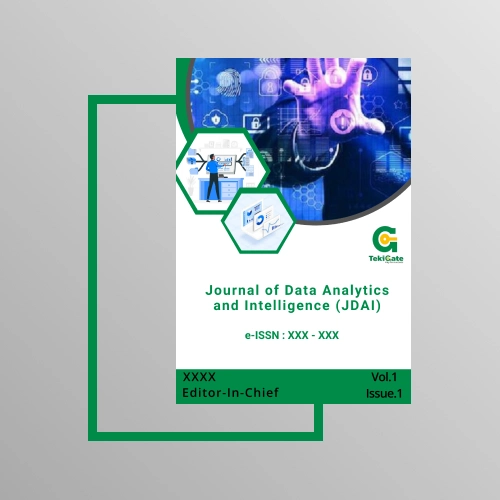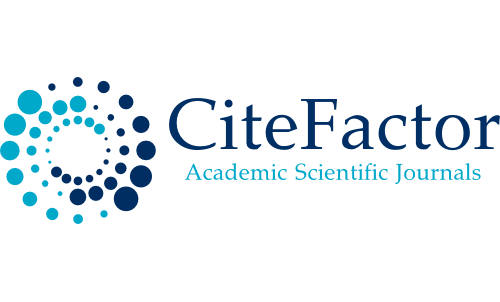Aims
The Journal of Data Analytics and Intelligence (JDAI) is a peer-reviewed, interdisciplinary journal that focuses on the theory, methodologies, applications, and implications of data analytics and intelligence. JDAI aims to provide a platform for researchers, practitioners, and policymakers to share their insights, discoveries, and innovations in the rapidly evolving field of data analytics and intelligence.
Scope of the journal
- Foundations of Data Analytics: JDAI covers fundamental concepts, theories, and methodologies in data analytics, including data preprocessing, feature selection, dimensionality reduction, and data mining techniques.
- Machine Learning and Artificial Intelligence: JDAI welcomes research on machine learning algorithms, deep learning models, neural networks, and other AI techniques applied to data analytics tasks such as classification, regression, clustering, and anomaly detection.
- Big Data Analytics: JDAI explores the challenges and opportunities associated with analyzing large-scale and complex datasets, including distributed computing, parallel processing, scalability, and real-time analytics.
- Predictive Analytics and Modeling: JDAI focuses on predictive modeling, forecasting, and decision-making techniques that leverage data analytics to anticipate future trends, behaviors, and events across various domains.
- Text and Natural Language Processing: JDAI covers research on text mining, sentiment analysis, document classification, and natural language processing techniques applied to unstructured data sources such as text documents, social media posts, and web content.
- Visual Analytics and Data Visualization: JDAI examines the design, development, and evaluation of interactive visualization tools and techniques for exploring, analyzing, and communicating insights from complex datasets.
- Business Intelligence and Analytics Applications: JDAI includes studies on the application of data analytics and intelligence in business contexts, including marketing analytics, customer relationship management, financial analytics, supply chain optimization, and risk management.
- Healthcare Analytics: JDAI addresses the use of data analytics and intelligence in healthcare settings, including clinical decision support systems, disease prediction, patient monitoring, and health outcome analysis.
- Social and Behavioral Analytics: JDAI investigates the analysis of social networks, user behavior, and online interactions to understand human behavior, sentiment dynamics, and information diffusion patterns.
- Ethical and Privacy Considerations: JDAI examines the ethical implications of data analytics and intelligence, including issues related to data privacy, fairness, transparency, accountability, and bias in algorithmic decision-making.
JDAI encourages submissions of original research articles, review papers, case studies, and practical applications that contribute to advancing the theory, methodology, and practice of data analytics and intelligence across various domains. The journal aims to promote interdisciplinary collaboration and foster a deeper understanding of the opportunities and challenges in harnessing data-driven insights for societal benefit.
Editor-In-Chief:
Dr. L. T. Herlin
Associate Professor
Department of Computer Science and Engineering
Mar Ephraem College of Engineering and Technology
Affiliated to Anna University, Chennai
Malankara Hills, Elavuvilai, Marthandam,
Tamil Nadu 629171
India
herlin@marephraem.edu.in
https://marephraem.irins.org/profile/578624
Editor:
1. Dr. Rituparna Mukherjee
Assistant Professor
Department of Electrical Engineering,
Swami Vivekananda University, Telinipara,
Barasat Barrackpore Rd Bara Kanthalia,
West Bengal 700121
India
rituparnamukherjee@svu.ac.in
https://www.swamivivekanandauniversity.ac.in/electrical-engineering
2. Dr. A. Ajil
Assistant Professor
Department of Computer Science and Engineering
REVA University,
Rukmini Knowledge Park, Kattigenahalli,
Yelahanka, Bangalore 560064,
India
ajil.a@reva.edu.in
https://www.reva.edu.in/school-member/a-ajil
3. Dr. T. Brindha
Associate Professor
Department of Information Technology
Noorul Islam Centre for Higher Education,
Kumaracoil, Thuckalay, Kanyakumari Dist,
Tamil Nadu 629180,
India
brindha@niuniv.com
https://www.niuniv.com/faculty.php?staffid=12f0108160
4. Dr. Ali Fahim Nima Al-Yasiri
Assistant profesor
Department of Computer Science
Wasit university
Wasit -alkut city, Wasit-52001
Iraq
afahim@uowasit.edu.iq
https://cit.uowasit.edu.iq/afahim
5. Dr. Vugar Abdullayev
Associate Professor
Department of Computer Engineering
Azerbaijan State Oil and Industry University
Azadlig Avenue, Baku-AZ1010
Azerbaijan
Vuqar.abdullayev@asoiu.edu.az
https://asoiu.edu.az/information_technologies_and_control/teacher_single/22
6. Dr. Md. Hakikur Rahman
Professor and Head
Department of Computer Science & Engineering
International Standard University
69 Mohakhali C/A, Dhaka-1212
Bangladesh
hakik@isu.ac.bd
https://www.isu.ac.bd/faculty/2/2/4601/Dr.%20Md.%20Hakikur%20Rahman
7. Dr. Eng. Jouma Ali Al-Mohamad
Faculty of Information Engineering
Al-Shahbaa Private University
Aleppo, Syria-500001
Syria
jalmohamad@su.edu.sy
https://www.su.edu.sy/en/informatics2
8. Dr. Uruj Jaleel
Professor
Department of Master of Computer Applications
Meerut Institute of Engineering & Technology
N.H. 58, Delhi-Roorkee Highway,
Baghpat Road Bypass Crossing Meerut-250005
Uttar Pradesh
India
uruj.jaleel@miet.ac.in
https://miet.ac.in/computer-applications/faculty.php
Submission Instructions
Authors are kindly requested to submit their manuscripts via the online submission system available on the TekiGate Journals website. Detailed guidelines for manuscript preparation and submission can be accessed on the journal's submission page. Manuscripts should be formatted according to the journal's specifications and submitted in a standard document format (e.g., Microsoft Word).
Plagiarism
Authors must ensure that their submissions are original and have not been previously published. Any form of plagiarism or academic misconduct will lead to immediate rejection of the manuscript. Proper citation and referencing of all sources used in the work are essential.
Responsibilities
Authors bear the responsibility for the accuracy and integrity of the content presented in their manuscripts. They must ensure that all data and findings are reported truthfully, and that proper methodology is followed. Authors should also disclose any conflicts of interest and obtain necessary permissions for any copyrighted material used in their work.
Copyright
While authors retain the copyright of their work, they are required to grant TekiGate Journals the right to publish and distribute the manuscript. By submitting their manuscript, authors agree to adhere to the journal's terms and conditions regarding copyright and publication rights.
Reference
Authors should adhere to the journal's specific referencing style for citations and references. Detailed instructions on citation formatting can be found in the journal's author guidelines. Authors are encouraged to utilize primary and peer-reviewed sources to support their arguments and findings.
Ethical Statements
Authors must uphold the highest ethical standards in their research and writing endeavors. This includes accurate citation of sources, transparent reporting of data, and disclosure of any conflicts of interest or funding sources. Authors are also responsible for ensuring that their research involving human or animal subjects complies with ethical guidelines and regulations
Source Files
Authors should prepare their manuscripts using the journal's provided template and submit source files alongside the manuscript. Source files may include text documents, figures, tables, and any additional supplementary materials. Authors should ensure that all files are appropriately labeled and formatted according to the journal's guidelines
Author Information
Authors are required to furnish complete and accurate information about themselves, including affiliations, contact details, and a brief biographical statement. This information will be utilized for correspondence and publication purposes. Authors should clearly indicate the corresponding author for communication regarding the manuscript.
Publishing Ethics
TekiGate Journals is dedicated to upholding the highest standards of publishing ethics. Authors, reviewers, and editors are expected to adhere to ethical guidelines and principles throughout the publication process. Any concerns regarding ethical issues or misconduct should be promptly reported to the editorial office for investigation.
Abstract
Authors are encouraged to provide a concise abstract summarizing the main findings and contributions of their manuscript. Keywords should be included to aid in indexing the article for search engines and databases. Additionally, authors should present clear and accurate results, supported by appropriate data and analysis, to enhance the understanding and impact of their research.
Indexing
Google scholar
DOI
Crossref
CiteFactor




Archive
Contact us
Module No.2, Roof Top, Gayatri Building, Phase I,
Technopark,
Trivandrum, 695 581, India.

